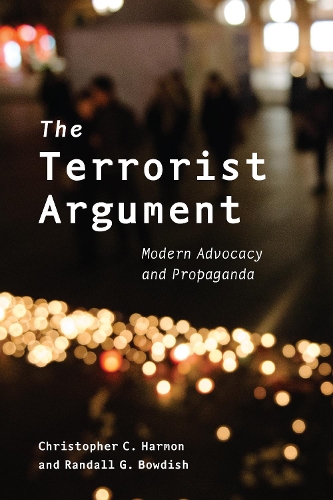
The Terrorist Argument: Modern Advocacy and Propaganda
(Paperback)
Publishing Details
The Terrorist Argument: Modern Advocacy and Propaganda
By (Author) Christopher C. Harmon
By (author) Randall G. Bowdish
Bloomsbury Publishing PLC
Brookings Institution
9th January 2018
United States
Classifications
Professional and Scholarly
Non Fiction
Political control and freedoms
Armed conflict
Communication studies
303.625
Physical Properties
Paperback
352
Width 153mm, Height 228mm, Spine 20mm
494g
Description
From chants and pamphlets to the Internet, terrorist propaganda can be deadly effective
Propaganda used by terrorists and armed groups might not always be the most sophisticated or nuanced form of rhetoric, but with the right mix of emotion and logic it can be extremely effective in motivating supporters and frightening opponents. This book examines how terrorist groups in recent history have used propaganda, and how they had adapted to new communications technologies while retaining useful techniques from the past.
Harmon and Bowdish trace how armed groups and terrorists around the globe have honed their messages for maximum impact, both on the communities they hope to persuade to support them and on the official state organs they hope to overthrow. Sometimes both the messages and the techniques are crude; others are highly refined, carefully crafted appeals to intellect or emotion, embracing the latest forms of communications technology. Whatever the ideas or methodology, all are intended to use the power of ideas, along with force, to project an image and to communicatenot merely intimidate.
The Terrorist Argument uses nine case studies of how armed groups have used communications techniques with varying degrees of success: radio, newspapers, song, television, books, e-magazines, advertising, the Internet, and social media. It is fascinating reading for anyone interested in civil conflict, terrorism, communications theory and practice, or world affairs in general.
Reviews
This is a comprehensive account of how terrorists and other types of insurgents utilize a variety of communication techniques in their propaganda to spread their messages, radicalize and motivate their adherents, and demonize their adversaries. . . . In examining the evolution of the communication technologies employed over the years, the authors employ a valuable methodology with each case study, highlighting a specific technology terrorist groups had utilized during the period of its activity."- Dr. Joshua Sinai, Perspectives on Terrorism;
"The sharpness of the description of al-Suri offered by Harmon and Bowdish is characteristic of the whole book, which provides an impressively detailed historical framework for each chapter, as well as clear pictures of diverse scenarios and settings. The Terrorist Argument's main contribution to the scholarship is a new understanding of terrorist messages in the context of the media used to propagate them, and of how are separable action and public argument are in modern terrorism."- Sara Brzuszkiewicz, The American Interest
Author Bio
Christopher C. Harmon is a terrorism specialist and held the privately endowed Horner Chair at the Marine Corps University Foundation. He has lectured at INTERPOL headquarters, on Capitol Hill, and at dozens of universities and graduate schools, in the United States and abroad. The lead author or editor of four books on terrorism and counterterrorism, he has published essays in the geopolitics journal Orbis, Strategic Studies Quarterly, and Oxford bibliographies.
Randall G. Bowdish is a retired Navy captain who commanded the USS Simpson as part of the George Washington Battle Group when the USS Cole was bombed in Aden. He has lectured at the NATO Center of Excellence for Defense Against Terrorism and the Institute of World Politics and has taught courses on terrorism, irregular warfare, and strategy at the Marine Corps Command and Staff College, University of Nebraska, Nebraska Wesleyan University, and the U.S. Air Force Academy, where he presently teaches. He has published widely on the subject of terrorism.
